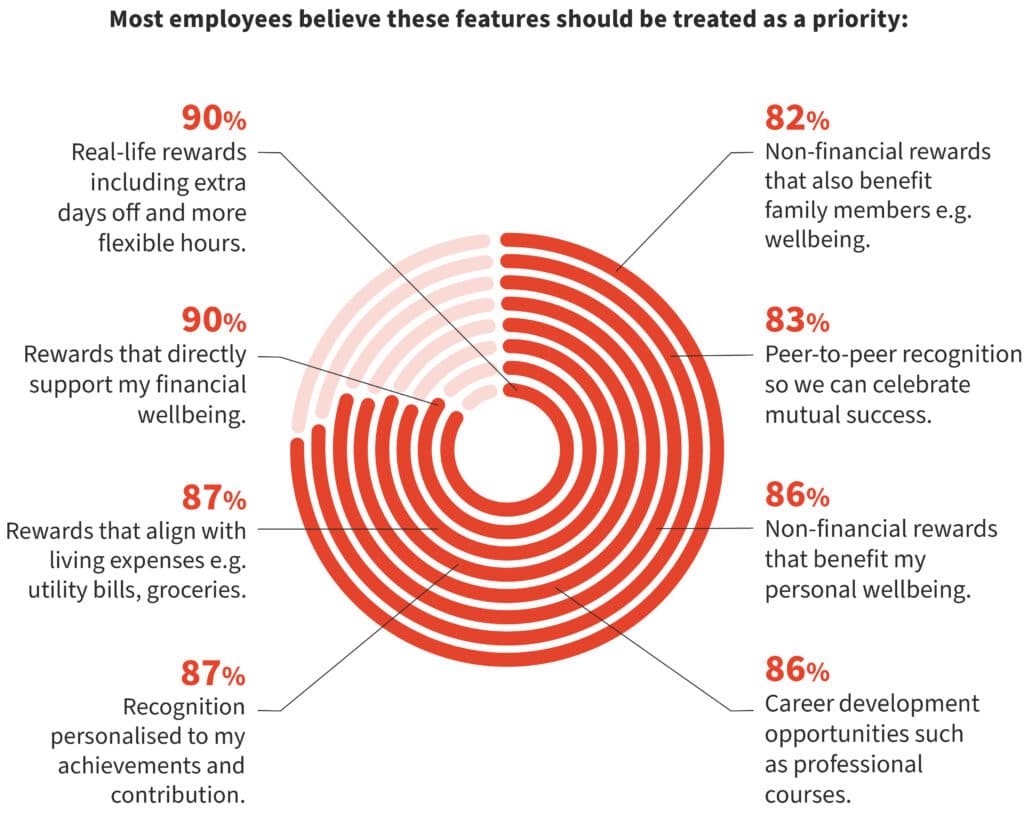A leading provider of employee benefit solutions has unveiled new study findings that showed significant disconnect between employee desires and the realities of work perks.
Boostworks examined ‘Beyond the Salary Slip’, which took into account the opinions of more than 3,000 HR professionals, C-suite and employee respondents.
The research, carried out by Opinion Matters, highlights the stark difference between what employees wished for compared to the realities of benefit schemes, including reward, recognition and wellbeing programmes.
The findings paint a compelling picture with a mere 40% of employee benefits being utilised, and 47% of employees feeling undervalued, believing leaders are out of touch with their reward preferences.
A concerning 54% of employees polled said they are rarely, if ever, consulted about benefits schemes that directly impact their work-life satisfaction.

While competitive salaries remain important, the study highlights that a staggering 92% of employees say benefits significantly impact their overall job satisfaction.
Boostworks CEO, Andy Caldicott, said: “This fulfilment translates to increased engagement, with strong benefits packages leading to a reported boost in employee productivity. The needs of today’s workforce are more diverse than ever. Gone are the days of a one-size-fits-all benefits approach. With Millennials and Gen Z prioritising student loan repayment assistance and mental health benefits alongside traditional offerings, a well-designed package caters to these evolving needs. Furthermore, the findings show a clear connection between strong benefits and business success.”
Other findings
Attraction and alignment: 63% of employees were attracted to their current job due to the company’s reward, recognition, and benefits programs. However, over two fifths (44%) of employees feel they do not get rewarded by their organisation at all for their accomplishments.
Recognition deficiency: 65% of employees believe improvements are needed to their organisation’s current reward and recognition programme. Furthermore, a concerning 44% of employees feel that they do not receive any recognition from their organisation for their accomplishments, contributing to a sense of unacknowledged efforts for 52% of employees (over the past 12 months).
Lack of understanding: Just under a quarter (21%) of employees admit to not fully understanding the reward, recognition, and benefits available to them through their employer.
Top priorities for recognition: Work anniversaries, birthdays, and significant life events such as births or adoptions of a child top the list of events employees believe should be recognised and rewarded.
Desire for tailored benefits: While 54% of employees currently have tailored benefits, the majority desire more personalised rewards, with 90% expressing a preference for immediate rewards that offer real-life benefits, such as extra days off or flexible working hours. Wellbeing and Development priorities are also considered priorities for employees: with a strong desire for non-monetary recognition supporting wellbeing (82%), career development opportunities (86%), and peer-to-peer recognition initiatives (83%).
Next generation wants and desires: Millennials and Gen Z employees want to see student loan repayment assistance and mental health benefits prioritised alongside traditional offerings.
Customisation
Andy added: “Promisingly, 72% of companies are actively planning to customise their benefits offerings, highlighting the strategic importance placed on attracting and retaining talent. The learnings from this research are clear – now is the time to reflect, recalibrate, and reinvigorate the strategies and programmes that will define your success in recognising and valuing your most important asset: your people.
“By offering a comprehensive employee benefits package that addresses the needs of a multigenerational workforce, businesses can position themselves as employers of choice. This translates into competitive advantage, allowing them to attract and retain top talent in today’s dynamic job market. To find out how to transform your benefits, rewards and recognition programmes download the full white paper here.”

